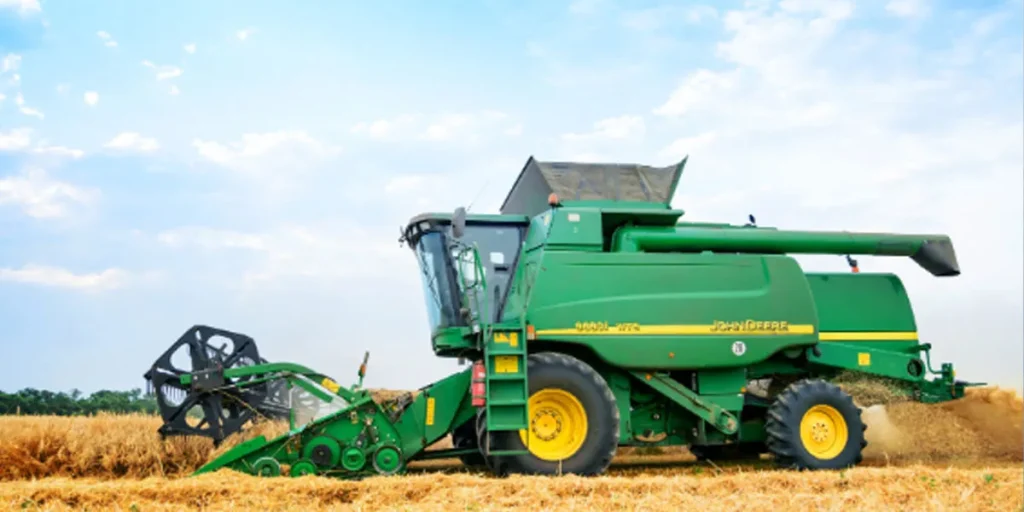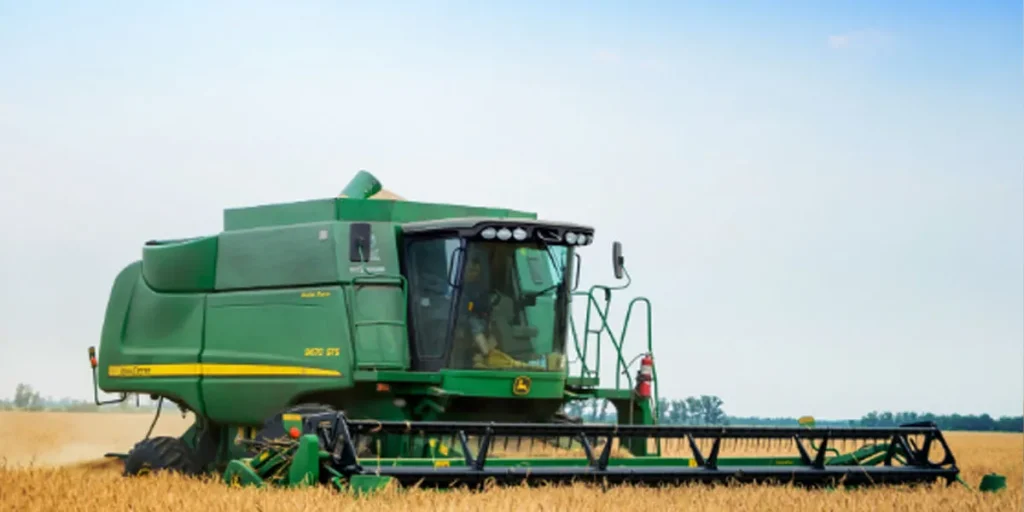The weight of a John Deere tractor varies from about 1,600 to 12,500 pounds. The model and equipment attached determine the specific weight.
John Deere tractors represent a cornerstone of agriculture and landscape maintenance, known globally for their durability and performance.
With a range spanning from compact utility to large agricultural tractors, John Deere provides options suitable for a myriad of tasks.
The compact models, like the John Deere 1023E, typically start at the lower end of the weight spectrum.
Mid-range utility models, such as the 5 Series, offer a balance of power and weight for diverse farm work.
On the other end, the 8R/8RT series brings heavyweight power for large-scale farming operations.
Potential buyers and operators should note the importance of tractor weight regarding functionality, towing capacity, and soil compaction.
Access to this information allows for an informed decision, ensuring that the tractor’s capabilities align with the tasks at hand.
John Deere’s Legacy In Agriculture
John Deere’s Legacy in Agriculture echoes through farms worldwide. The name is synonymous with steadfast farm equipment. For generations, these iconic green and yellow tractors have been a symbol of agricultural reliability.
Agricultural Milestones
John Deere’s journey transformed farming practices across the globe. Important milestones include:
- 1837: The first steel plow, kickstarting modern farming.
- 1918: Deere enters the tractor business, enhancing farm mechanization.
- 1960s: The introduction of the “New Generation of Power”, modernizing tractor design.
Innovation And Durability
John Deere never stops innovating. Durability and performance are at the heart of every machine built. Features that stand out in their tractors include:
| Year | Innovation | Impact |
|---|---|---|
| 1980s | Sound-Gard body | Reduced operator fatigue. |
| 1990s | Full-frame design | Enhanced tractor stability. |
| 2000s | Autotrak System | Introduced precision agriculture. |
These innovations ensure longer life and unmatched efficiency on the fields.
Categories Of John Deere Tractors

Delving into the diverse world of John Deere tractors, one discovers several categories tailored to various needs. Each category brings unique features and, of course, different weights. Understanding these classes helps in choosing the right tractor for the job.
Utility Tractors
The backbone of many farms, utility tractors are versatile machines. Weights range based on model and attachments:
- John Deere 5 Series: Approximately 7,500 pounds.
- John Deere 6 Series: Up to 24,000 pounds for the larger models.
These tractors adapt to tasks such as mowing, loading, and general farm work.
Row Crop Tractors
Designed for precise agriculture, row crop tractors are ideal for planting and cultivating rows. Weight examples include:
| Model | Weight |
|---|---|
| John Deere 7R Series | Around 24,700 pounds |
| John Deere 8R/8RT Series | Up to 34,000 pounds |
Heavier models provide more power and stability on varied terrains.
Specialty Tractors
Specialty tractors meet unique needs and vary greatly in weight:
- Narrow: For vineyards, as light as 4,000 pounds.
- High-Crop: Elevate over tall crops, weight starts at 8,000 pounds.
- Low Profile: For low-clearance areas, roughly 5,500 pounds.
These specialized tractors ensure peak performance in specific conditions.
Importance Of Weight In Tractor Performance

When discussing agricultural machinery like John Deere tractors, weight plays a crucial role. Weight impacts a tractor’s efficiency, stability, and overall performance.
A well-balanced tractor weight ensures optimal operation during different farm tasks.
Stability And Traction
Stability is essential for any tractor’s performance. A heavier tractor usually means a more stable ride, especially on uneven terrain.
Traction is another key aspect. Without proper traction, tractors cannot transfer power to the ground effectively.
This can lead to slips or reduced productivity. Correct weight distribution enhances both stability and traction, which is vital for safety and efficient fieldwork.
Power-to-weight Ratio
The power-to-weight ratio is a delicate balance. Too much weight may lead to excessive fuel consumption or soil compaction. Conversely, insufficient weight means less traction and power delivery.
Finding the right ratio is essential for peak tractor performance. John Deere engineers design tractors with optimal weight to maximize power usage while minimizing negative impacts on the soil and efficiency.
Below is a simplified table showcasing the significance of weight distribution in John Deere tractors:
| Weight Aspect | Impact on Tractor Performance |
|---|---|
| Overall Weight | Dictates stability and efficiency |
| Weight Distribution | Affects traction and maneuverability |
| Power-to-Weight Ratio | Influences fuel economy and power delivery |
Weight Range Of John Deere Tractors
John Deere tractors are iconic for their reliability and power. The weight of a John Deere tractor varies widely.
It depends on the model and its purpose. From gardening to farming, there’s a tractor that fits the job. Below we explore the different weight ranges you can expect.
Compact Tractors
These small but mighty machines are the lightweights of the John Deere family. They boast easy maneuverability.
- Ease of use: Perfect for small-scale farming.
- Versatility: They work well for landscaping projects too.
| Model | Weight |
|---|---|
| 1 Series | 1,450 – 1,630 lbs |
| 2 Series | 1,900 – 2,415 lbs |
Mid-range Tractors
Mid-range tractors find a balance between power and size. They are suited for a variety of tasks.
- Flexibility: Ideal for mid-sized farms and estates.
- Capability: They handle tougher jobs with precision.
Models like the 5 Series: They weigh between 4,519 lbs to 12,313 lbs.
Large-scale Agricultural Models
These are the heavyweights. They can handle the most demanding farming tasks. Their weight reflects their capability.
- Powerful for large-scale operations.
- Durable for consistent, heavy use.
Models such as the 9 Series: These can weigh up to 20,000 lbs or more.
All these weights help ensure the tractor performs its best.
John Deere tractors have a model to match every weight requirement.
Factors Influencing Tractor Weight
Understanding how much a John Deere tractor weighs is critical before a purchase or operation.
Weight affects performance, efficiency, and suitability for certain tasks. Several factors play a role in determining a tractor’s weight, each contributing in its unique way.
Engine Size
Engine size directly impacts a tractor’s weight. Larger engines provide more power but add to the overall mass. Tractors designed for heavy-duty tasks often feature these robust engines, leading to a heavier build.
Build Material
The build material influences the durability and weight of a John Deere tractor. Durable materials like steel add strength but increase weight.
Modern John Deere tractors may incorporate lighter materials in non-critical parts to reduce weight without compromising on structural integrity.
Added Features And Attachments
Added features and attachments greatly affect a tractor’s weight. Options like GPS systems, front-end loaders, or mowing decks add utility but also additional pounds. Here’s a brief look at how various attachments can alter weight:
- Basic Attachments: Plows, harrows – minimal weight increase
- Complex Attachments: Loaders, backhoes – significant weight increase
- Comfort Features: Enclosed cabs, air conditioning – moderate weight increase
When selecting a John Deere tractor, consider the tasks at hand and the potential attachments needed. Matching tractor capabilities with job requirements ensures optimal performance.
Real-life Applications And Weight Considerations
Understanding the weight of a John Deere tractor is crucial for various reasons.
From determining the right model for specific farming needs to transport logistics, weight plays a significant role.
Tractors must be robust enough to handle tasks but light enough for easy movement.
Let’s explore what weight means in real-life scenarios.
Small Farms Vs. Large Operations
The size of the operation influences the choice of tractor weight.
Small farms benefit from lighter, more agile models for ease of use in limited spaces.
Conversely, large operations may require heavier tractors for intensive tasks.
- Small Farms: Typically opt for models under 4,500 lbs for flexibility.
- Large Operations: Often need tractors over 10,000 lbs for tough jobs.
Transportation And Mobility Issues
The weight of a tractor affects how it’s moved from one field to another.
Tractors that are too heavy may need special permits or equipment for transport.
Lighter tractors offer more freedom and fewer regulations.
| Tractor Weight | Mobility |
|---|---|
| <7,500 lbs | Usually no special transport needed |
| 7,500 – 10,000 lbs | May require additional considerations |
| >10,000 lbs | Special permits and transport likely |
FAQ About the Weight of a John Deere Tractor
What Is The Average Weight Of John Deere Tractors?
The average weight of John Deere tractors varies by model. Compact tractors weigh around 1,600 to 2,200 pounds. Larger agricultural models can weigh up to 10,000 pounds or more, depending on specifications and attachments.
How Does Model Affect John Deere Tractor Weight?
John Deere tractor weight is heavily influenced by the model and series. Smaller models like the 1 Series weigh less, while large agriculture tractors like the 8R Series can weigh over 20,000 pounds.
Are Attachments Included In John Deere’s Weight Specifications?
Attachments are generally not included in the listed weight specifications of John Deere tractors. Weights specified are typically for the base model without additional equipment or implements.
Can The Weight Of A John Deere Tractor Impact Its Usage?
Yes, the weight of a John Deere tractor affects its usage. Heavier tractors provide more traction and power for tough tasks, while lighter models are better for smaller, delicate jobs and easier maneuverability.
Conclusion
Understanding the weight of a John Deere tractor is crucial for matching your agricultural needs with the right equipment. From compact utility models to larger farm tractors, weights vary significantly.
Selecting the appropriate tractor ensures efficiency and safety on the job.
For precise specifications, always refer to official John Deere resources or consult with a dealer. Your success in farming relies on informed equipment choices.
